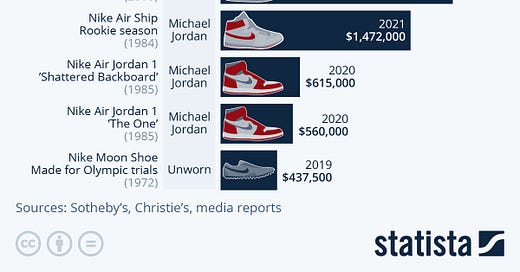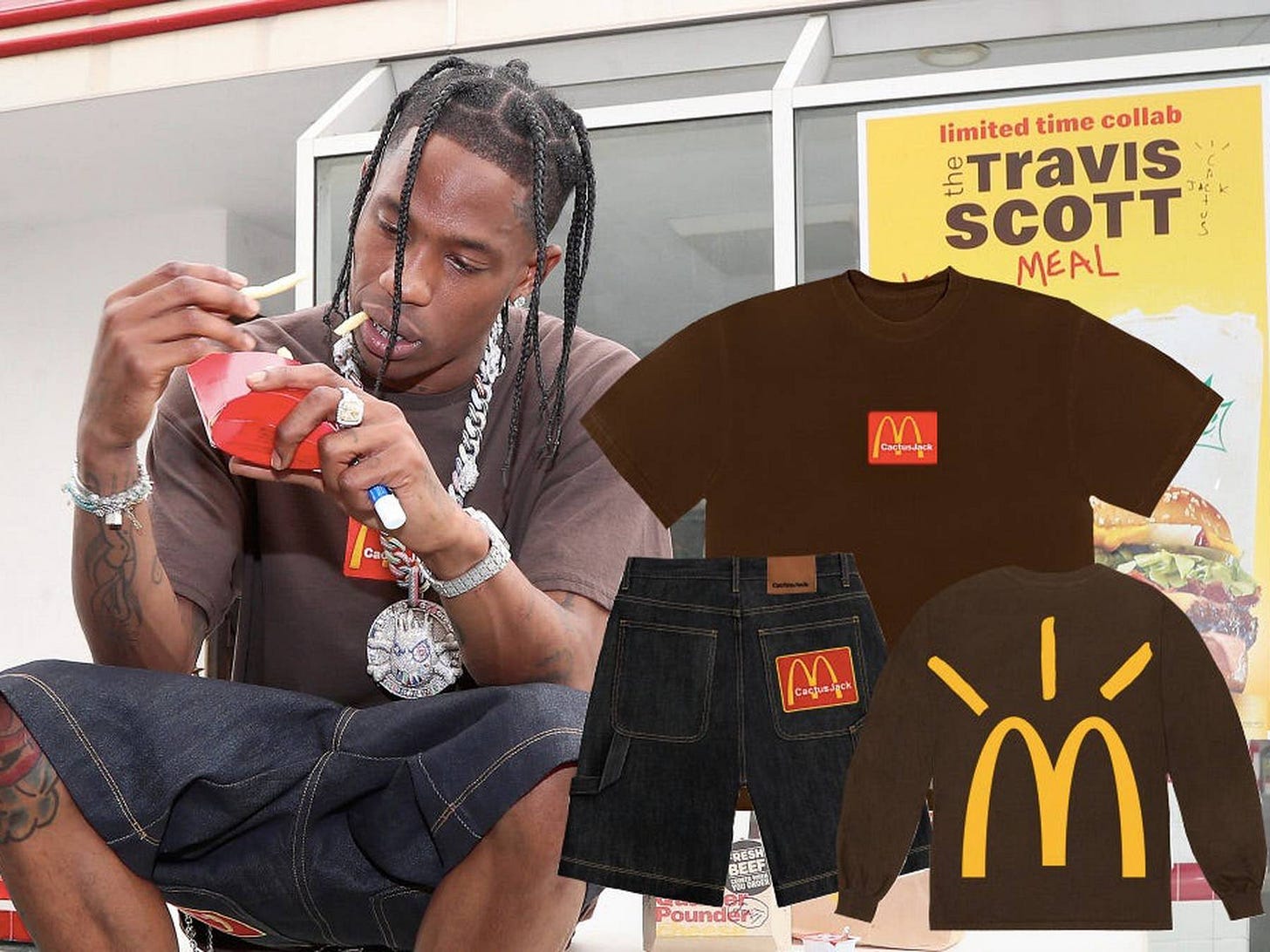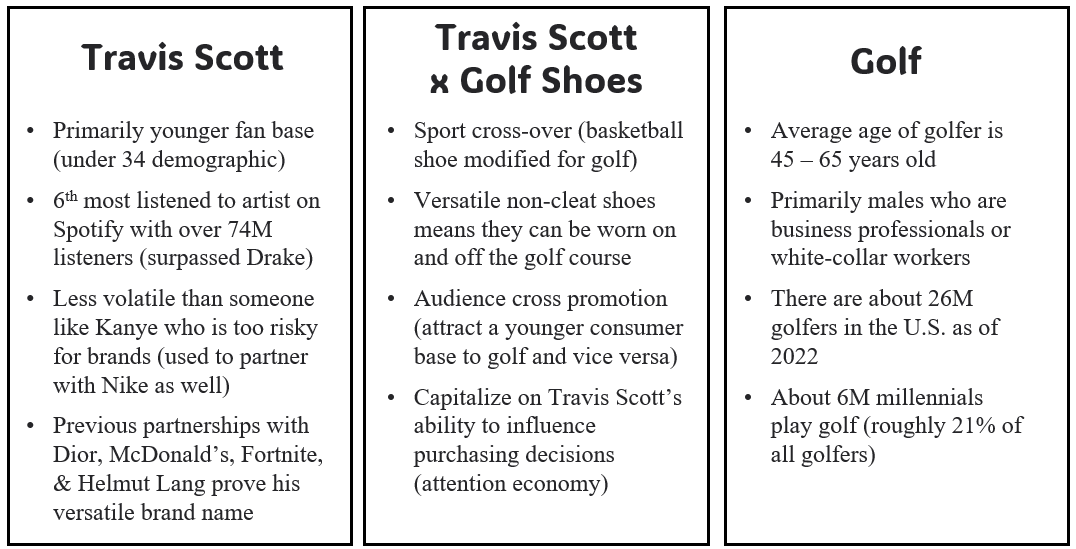What do Travis Scott & golf have in common?
Travis Scott's branding masterclass, surviving a PR disaster, golf cross-promotion, and Nike's continued reign
Health Score: 9/10
Diagnosis: Nike is a mastermind at capitalizing on public figures’ positive image to increase its brand equity - whether that be partnering with athletes, artists, or models. Its latest partnership is a prime example in how to cross-sell and build brand equity the right way.
Observations: Every one of Nike’s partnerships is carefully curated and executed. And this one is no exception. With the help of Travis Scott, Nike is able to continue increasing its brand awareness and consumer engagement as well as cross-sell into a new consumer base via modified basketball shoes for golf. Despite the 2021 Astroworld concert disaster, Travis Scott was able to maintain his partnership with Nike (and we know Nike would have dropped him had it sensed this would negatively impact the brand).
Summary: Travis Scott was able to come out of the 2021 AstroWorld tour accident relatively unscathed largely because he was ultimately found not guilty and privately settled several of the lawsuits against him. In light of that, he was able to maintain his partnership with Nike and other prominent brands. He has successfully capitalized on his fame to become not just a rapper and songwriter but a brand. His extensive portfolio of partnerships is a clear indication that his name, persona, and image are a valuable asset. Clearly, he has work to do when it comes to improving safety for his concertgoers; however, he is undoubtedly a powerful influence.
The Birth of the Nike Air Jordan
It’s 1984. A rookie named Michael Jordan is starting his first season in the NBA, playing for the Chicago Bulls. Nike approaches him for a partnership and together they began collaborating on what are now the famous Air Jordan shoes.
However, there’s more to the story. NBA rules required players to wear white shoes. Players were fined $5k each time they wore shoes that broke the rule (were not white).
Chicago Bulls colors are black, red, and white and those were the colors on the shoes that Michael Jordan wore as part of his partnership with Nike. Nike was more than glad to pay for the fines he incurred because in the first year alone, Nike brought in $126M. The $5k fine was essentially the marketing cost each time that Michael Jordan broke the rules wearing his Air Jordan shoes. Michael Jordan and Nike both made billions off the partnership that continues to this day. This is a prime example of how brands like Nike build brand equity. As of April 2023, the Nike Air Jordan 13, worn by Michael Jordan is the most expensive shoe, selling at an eye-popping $2.2M.
Fast forward to 2023, Nike is still partnering with Michael Jordan but also with dozens of other athletes and musicians. Most recently, Nike unveiled its latest limited-edition release, the Travis Scott x Air Jordan 1 Low Golf shoe, which promises to send every golf shot “right down the middle of the fairway”. However, this collab is anything but that.
Travis Scott is a Grammy-nominated and chart-topping rapper, singer, and record producer. Nike is the undisputable global leader in athletic footwear and apparel. That partnership in and of itself is a no brainer. However, collaborating with a rapper on golf shoes is a little head scratching.
An Unlikely Collab
The Travis Scott x Air Jordan 1 Low Golf collab features olive-colored golf sneakers with a reverse Swoosh branding and “Cactus Jack” label on the heel and insole. The shoes became available on October 13 and can be purchased through a lottery on Nike’s SNRKS app and via select retailers. It’s rumored that Nike made only 10,000 pairs. Scarcity and limited availability signal value, and value drives demand. This also means that the Low Golf sneakers are very likely to command a premium price on the sneaker resale market (the shoes retailed for $170). This a positive sign for Nike because it indicates how much consumers value the sneakers and in turn, whether or not Nike should continue the partnership or make more pairs available.
Building Customer Loyalty à la Hermes
However, there is a catch. Not everyone will be able to get their hands on these shoes. Nike is granting exclusive access to loyal SNKRS app members and Nike customers who meet the following criteria:
Have previously tried and failed to purchase at least 3 Travis Scott shoes on the SNKRS app
Have purchased at least one Nike golf footwear product in the period between January 2, 2022 - October 8, 2023
This is similar to how Hermes builds customer loyalty through exclusivity (customers need to have a history purchasing other Hermes products before they are eligible to purchase a Birkin; even then they cannot choose the Birkin style or color).
This also ensures the shoes land in the hands of those who ultimately plan to wear them and not resellers who will list them online for 3 to 5 times the retail price.
Travis Scott’s Partnership History
Travis Scott is not just a rapper he’s a brand. Just take a look at his extensive resume of partnerships and personal brands.
2014: Been Trill (apparel)
2016: Diamond Supply Co. (apparel), Bape (apparel), Maharishi (apparel)
2017: Nike (shoes), Helmut Lang (apparel), Ksubi (apparel), Virgil Abloh (apparel)
2018: Saint Laurent (vinyl record), Readymade (apparel)
2019: New Era x Houston Astros (field cap), Reese’s Puffs (cereal)
2020: Houston Rockets (apparel, swag), Hot Wheels (collectible cars), Fortnite (video games, virtual concert), Nerf (dart blaster), Uninterrupted (apparel), McDonald’s (special meal), Sony PlayStation (gaming console), Cacti (his own hard seltzer brand), Verzuz (apparel), Byredo (perfume), i-D Magazine (apparel)
2021: Neighbor (collectible), Fragment Design (apparel), Dior (runway collection), Mastermind Japan (apparel, caps)
2022: Zouk Nightclub (apparel)
2023: Circus Maximus (15 min. film)
Travis Scott’s Branding Masterclass
2020 was clearly Travis Scott’s year. It was also the year when all in-person concerts and events were cancelled due to COVID, and performers had to pivot. He did everything from clothing and perfumes to fast food and video game partnerships. In fact, in 2020, Travis Scott hosted a virtual concert inside Epic Games’ Fortnite which reportedly grossed $20M through merchandise sales (gross indicates revenues before any expenses). For comparison, this was more than the roughly $1.7M that Travis Scott grossed during a single live concert at his 2019 Astroworld Tour. And you can imagine that net of expenses, hosting a virtual concert is much more lucrative.
Travis Scott has clearly made some conscious and shrewd decisions when it comes to whom he chooses to partner with. He associates with both high-end labels (Dior, Helmut Lang) and accessible brands (Reese’s, McDonalds) alike.
He was able to make his brand image so versatile that he established collaborations with both Dior and McDonald’s within the same year. Dior and McDonald’s are as disparate as it gets - widely different target audience, accessibility, product offering, and price range. However, Travis Scott was able to capture both markets. That’s the beauty of building a strategic brand. The likes of Dior and McDonald’s are very wary of whom they partner with and clearly Travis Scott fit what both were looking for.
Travis Scott’s 2021 Astroworld Festival Disaster
In November 2021, Travis Scott hosted an Astroworld Festival in Houston which was attended by almost 50,000 fans. At one moment during the concert, a stampede of concertgoers surged towards the stage, causing some to be trampled and ten tragically dying due to compression asphyxia. Travis Scott claims it was difficult to see from the stage what was going on in the crowd; however, he was heavily criticized due to his history of encouraging fans to partake in reckless and unsafe behavior.
Ultimately, Travis Scott was found not guilty and no one individual was found responsible for the deaths. Travis Scott ended up losing a few partnerships, including those with W Magazine, Reese’s, and Mega64. He managed to maintain his partnership with Nike however it was on shaky terms following the incident. Nike issues a statement that it was pausing the release of its Air Max 1 x Cactus Jack shoes, “out of respect for everyone impacted by the tragic events at the Astroworld Festival”.
Dior issued a similar statement that they plan to indefinitely postpone the release of his runway collection; however, it ultimately launched in July 2022 (a few months after the original January 2022 release date). A portion of the proceeds were donated to Travis Scott’s Project H.E.A.L, an initiative that provides mental health resources to the youth.
As we can see from his partnership history above, not many brands that weren’t already working with Travis Scott initiated partnerships following the incident.
What most likely helped Travis Scott maintain several of his partnerships was that i) he was cleared of any criminal charges and ii) his ability to influence a mass audience is second to none. Brands are very risk averse when it comes to their public image and always calculating the risk & reward of continuing a partnership versus being associated with negative press. We all recall the numerous brands that dropped Kanye West for his horrendous stream of antisemitic comments (and rightfully so).
Now this doesn’t mean that Travis Scott was not guilty in the eyes of many; however, in the eyes of the law, he was not. Many (rightfully) claim this could all have been avoided if Travis Scott took the proper safety precautions and did not encourage fans to charge towards the stage.
McDonald’s Struggles to Lure in Gen Z
It seems like every brand nowadays is struggling to capture the attention (and wallets) of the Gen Z and Millennial demographic. The way they interact with brands and make purchasing decisions is different from every other demographic. In the age of social media and instant gratification, they rely more heavily on friends, peers, and celebrity idols for purchasing recommendations.
According to McDonald’s Chief Marketing Officer Morgan Flatley, the fast-food chain launched its partnership with Travis Scott in 2020 because:
“His ability to kind of see where culture is going and have a hand in where culture is going is really unique…Then you couple that with his huge followership and his fans, social-media footprint, and ... 3 billion streams. He just has an incredible audience.” Specifically, he is referring to the under 34 audience that is "becoming more and more challenging for brands to reach…How they engage with media is different.”
Not all are in agreement that this was a smart move for McDonald’s. Some criticize his less than “family friendly” persona given many of his rap songs have explicit lyrics (not to mention he encourages his concertgoers to partake in dangerous behaviors). However, it seems like the need to remain relevant and capture wallet share from the under 34 demographic outweighs that concern.
Travis Scott’s Alter Ego
Travis Scott’s nickname or alter ego is Cactus Jack, which is also the name of his record label. Interestingly, Travis Scott is not even his real name, it’s his stage name (his real name is Jacques Bermon Webster II).
In his partnership with McDonald’s, Travis Scott taps into his alter ego. Before ordering a Travis Scott meal, customers are to say “Cactus Jack sent me”. As you can see, there’s several layers to Travis Scott’s strategy and he is able to tap into whichever persona makes most sense and aligns with a brand’s image - whether that be Travis Scott the golfer or Cactus Jack the McDonald’s fan. This is what allowed him to secure partnerships with names such as Saint Laurent, Reese’s, Byredo, and McDonald’s (all wildly different).
What Travis Scott Doesn’t Do
While Travis Scott mixes high and low, as you might notice, he never does so within the same category. Let me explain.
Travis Scott is not partnering with Dior and simultaneously releasing a clothing line at Target, nor is he partnering with McDonald’s and the likes of Nobu. He mixes and matches within adjacent or completely unrelated categories. The key is that they do not directly clash. This allows for both him to have a versatile partnership portfolio and for the brand to maintain a cohesive image. Regardless if he is partnering with a clothing, perfume, video games, or fast-food brand, it is strategic and deliberate.
So Why Travis Scott & Golf Shoes?
Now that we have an understanding of Travis Scott’s brand image, let’s analyze why Nike would ever think to collaborate with Travis Scott on golf shoes. At first glance it seems like there might be little crossover based on his fanbase demographic and image (Travis Scott isn’t rapping about his love for golf that’s for sure). However, as we see in the below chart, there’s significant gains here from cross-promotion.
At the time of writing, Travis Scott has 53M Instagram and 11.8M X (formerly Twitter) followers. That’s an invaluable fanbase that many brands are eager to tap into. Attention is the new currency, and consumers are increasingly turning to their idols (be it celebrities, artists, or influencers) to make purchasing decisions.
Ultimately, it’s not about Travis Scott’s fashion sense but about his fashion influence. His long list of brand partnerships is a clear indicator of his strong influence and outsized audience reach. Travis Scott has clearly proven that he is a true cultural icon with a keen talent for not only music but also business.













